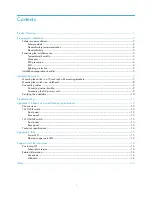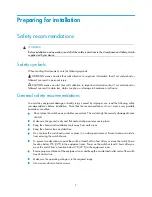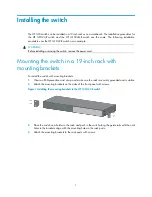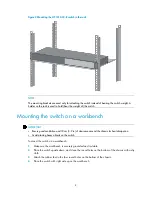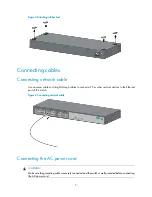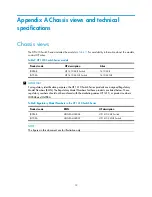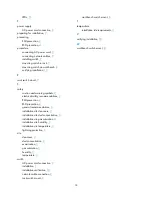
3
Electrical safety
•
Carefully examine your work area for possible hazards, like moist floors, ungrounded power
extension cables, or missing safety grounds.
•
Locate the emergency power-off switch in the room before installation. Shut off the power
immediately if an accident occurs.
•
Unplug all the external cables (including power cables) before moving the chassis.
•
Do not work alone when you operate the switch with the switch powered on.
•
Always check that the power has been disconnected when you perform operations that require the
switch to be powered off.
Examining the installation site
The HP 1410 switches must be used indoors. To ensure correct operation and a long lifespan for your
switch, the installation site must meet the requirements in this section.
Temperature/humidity
Maintain appropriate temperature and humidity in the equipment room.
•
Lasting high relative humidity can cause poor insulation, electric creepage, mechanical property
change of materials, or metal corrosion.
•
Lasting low relative humidity can cause washer contraction and ESD, and can cause problems
including loose captive screws and circuit failure.
•
High temperature can accelerate the aging of insulation materials and significantly lower the
reliability and lifespan of the switch.
Maintain temperature and humidity in the equipment room, as described in
Table 2
.
Table 2
Temperature/humidity requirements in the equipment room
Temperature Relative
humidity
0°C to 45°C (32°F to 113°F)
5% to 95%, noncondensing
Cleanness
Dust buildup on the chassis might result in electrostatic adsorption. Electrostatic adsorption causes poor
contact of metal components or contact points, especially when indoor relative humidity is low. In the
worst case, electrostatic adsorption can cause communication failure.
To ensure correct operation, the equipment room must meet the dust concentration requirements listed
in
Table 3
.



